Bb8.1
The Raven (Corvus) constellation is located below Virgo:
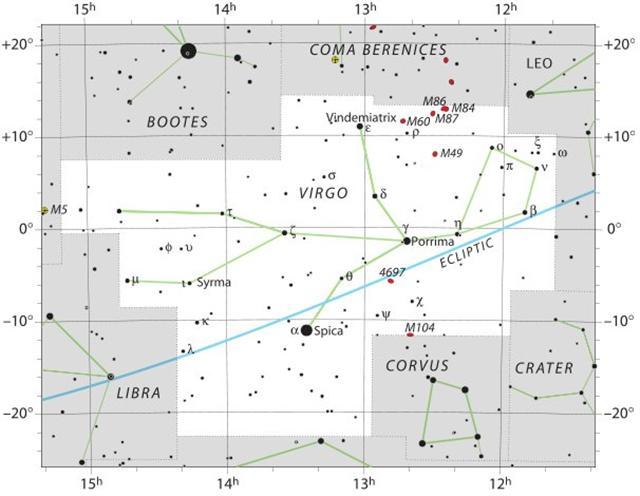
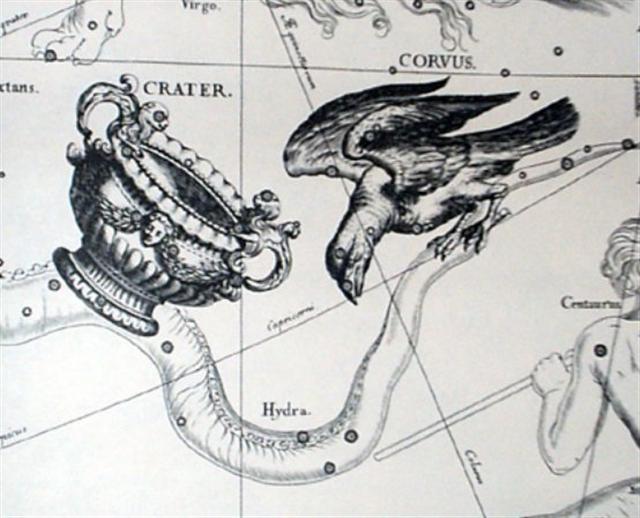
And the Precious Vase had been emptied just in front of him, at
the end of the season in leaf, where it finally had been used to
inundate the hind parts of Leo:
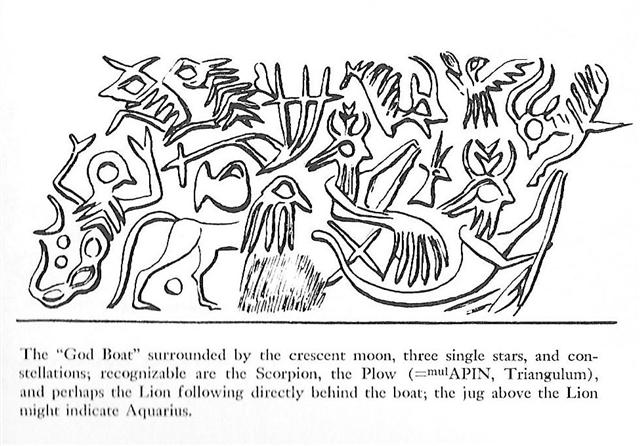
.jpg)
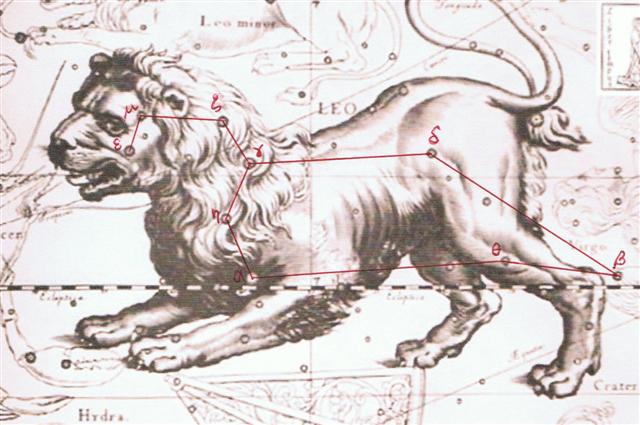
And all the sweet waters had then continued downwards, just out
of reach in front
of the Raven:
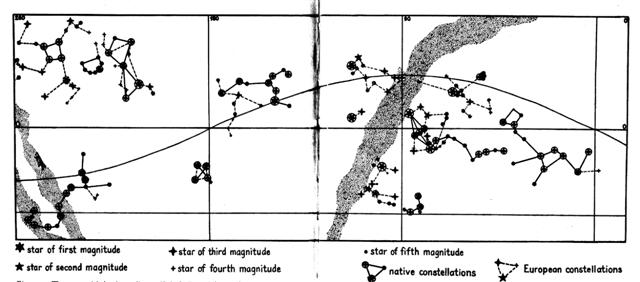
... the bird, being sent with a cup for
water, loitered at a fig-tree till the fruit became ripe, and
then returned to the god with a water-snake in his claws and a
lie in his mouth, alleging the snake to have been the cause of
the delay. In punishment he was forever fixed in the sky with
the Cup and the Snake; and, we may infer, doomed to everlasting
thirst by the guardianship of the Hydra over the Cup and its
contents. From all this came other poetical names for our Corvus
- Avis Ficarius, the Fig Bird; and Emansor, one
who stays beyond his time; and a belief, in early folk-lore,
that this alone among birds did not carry water to its young
...

It seems reasonable to assume Virgo was the first to reach the
northern spring equinox, commemorating the time when the Great
Ice age thawed away and made earth soft and fruitful.
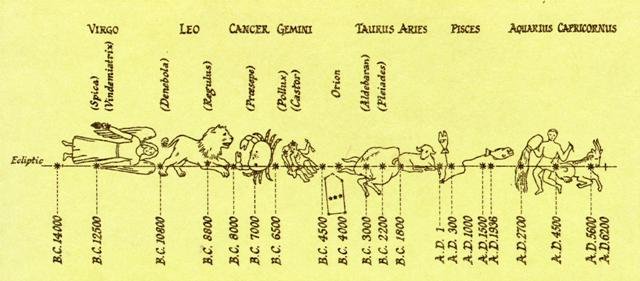
In the B text the last glyph in line b7 has been placed at May 9
(*49 → 7 * 7), which
should correspond to
glyph b1-23 on side b of the C tablet - a week before
Alcyone in the Pleiades.
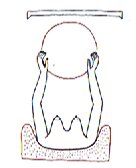
Number 123 could have been used e.g. to characterize the place 60 days before 183 (=
366 / 2) as well as that place defined by 64 days before 187.
However, the equation 129 (May 9) - 123 = 6 (→
366 - 360) might be more
relevant, in which case 6 + 177 = 60 + 123.
In any case, the G text (on its side a) should make us count 123 as
the distance from Ga2-27 (→ π) to *244
(→ 4 * 61 = ⅔ * 366):
|
 |
*123
|
 |
|
Ga2-27
(57) |
Ga7-11 (180) |
|
NAOS (*121) |
LESATH (*244) |
|
20h (304.4) |
VINDEMIATRIX |
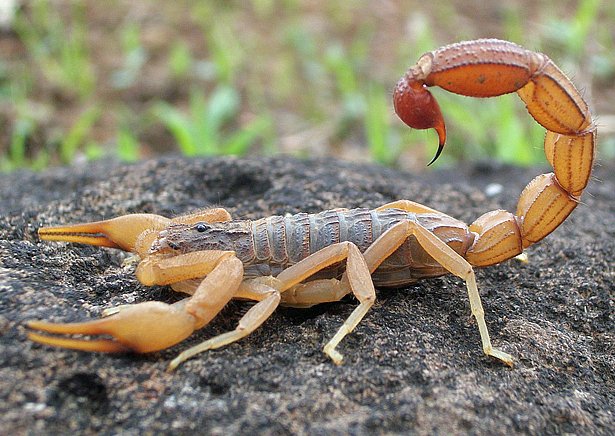
Might not Vindemiatrix - the Grape Gatherer - have corresponded to
Eve (Bb7-14) loitering at the Tree of Life?
 |
 |
 |
|
Bb7-4 (13 * 19) |
Bb7-5
(248) |
Bb7-6
(670 = 664 + 6) |
|
ki te maro - ku
hokohuki ia - ki te tagata |
mai tae oho atu ki te
rima - o to haga mama ia - ku hakatepe
ia |
ki to maitaki |
|
Atu. Particle of
meaning opposite to that of mai;
it refers to the second or third person,
expressing movement away:
ka-avai-atu, give it to him:
he-oho-atu au, I am going there,
after you; i-oho-atu-era, when I
had gone there. Vanaga. 1. a. Directive,
of motion from the speaker. b. Somewhat
expressive of the comparative degree. 2.
Pupil; hakaatu, proof; hare
hakaatuga, schoolhouse, class. 3. (hakaatu),
to presage. 4. (hakaatu), mark,
object. Churchill.
Mama. 1. To chew.
2. To mouth-feed (arch.) he-mama i te
vai tôa koia ko te tiapito kiroto ki te
haha o te poki, she mouth-feeds the
child with sugarcane juice together with
tiapito juice. 3. A sea mollusc
(with an eight-horned shell). Vanaga. 1.
To leak, to ooze, (maamaa). P
Pau., Mgv., Ta.: mama, id. 2. To
chew. P Mgv., Mq., Ta.: mama, id.
3. Light not heavy, (maamaa). P
Mgv., Ta.: mama, id. 4. A limpet
(Chiton magnificus). Mgv., Mq.,
mama, a shellfish. 5. To open the
mouth; hakamama, to yawn, to
gape, to be ajar. Pau.: hamama,
to open. Mgv.: akamama, to burst
open. Ta.: haamama, to open. Mq.:
haámama, to open the mouth. 6.
Ta.: mama-orero, conclusion of a
council. Ha.: mama, to finish, to
have done with a thing. Churchill.
Kahu. Clothing,
dress, habit, cloth, curtain, vestment,
veil, shirt, sheet; kahu hakaviri,
shroud; kahu nui, gown; rima o
te kahu, sleeve; kahu rahirahi,
muslin; hare kahi, tent;
horega kahu, shirt; hakarivariva
ki te kahu, toilet; rakai ki te
kahu, toilet; patu ki te kahu,
to undress; kahu oruga, royal
sail; kahu hakatepetepe, jib;
kahu nui, foresail; hakatopa ki
te kahu, to set sail; (hecki keho,
canvas T.) P Pau.: kahu, dress,
garment, native cloth. Mgv.: kahu,
cloth, stuff, garment, clothing. Mq.:
kahu, habit, vestment, stuff, tunic.
Ta.: ahu, cloth in general,
vestment, mantle. Chuchill. |
|
HELIACAL STARS: |
|
April 2 |
3 (29
+ 64) |
4 (459) |
|
JAN
28 |
29
(13 + 16) |
|
|
CIH (Whip)
= γ Cassiopeiae,
λ Tucanae (12.4),
φ³ Ceti (12.6), μ Andromedae (12.8)
*336.0 = *12.4 - *41.4 = 4 * 84 |
φ4 Ceti (13.2) |
No star listed (14) |
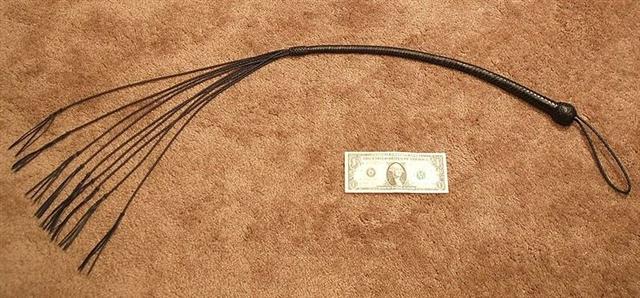 |
|
RIGHT
ASCENSION DAYS AT THE FULL MOON: |
|
Oct 1
(640 - 366) |
2
(275 = 93 + 182) |
3 (94
+ 182) |
|
JULY
29 (210 = 179 + 31) |
30 |
31
(29 + 183) |
|
κ
Crucis (194.4),
ψ
Virginis (194.5),
μ
Crucis,
λ
Crucis (194.6),
ALIOTH (Fat Tail) =
ε
Ursae Majoris,
ι
Oct.
(194.8)
*153.0 = *194.4 - *41.4 = 17 * 9 |
MIN-EL-AUVA
(Door of the Barker) =
δ
Virginis
(195.1),
COR CAROLI =
α
Canum Ven.
(195.3) |
δ
Muscae (196.5) ,
VINDEMIATRIX (Grape Gatherer) =
ε
Virginis
(196.8) |

... The medieval
names Auva, Al Awwa, and Minelauva
are from the Arabic, meaning
'barking (dog)'. This star, along
with β Vir (Zavijava), γ Vir
(Porrima), η Vir (Zaniah)
and ε Vir (Vindemiatrix),
were Al Awwā,
the Barker. On Euphrates it was
Lu Lim, the Gazelle, Goat, or
Stag, - or perhaps King; and, with
ε,
probably Mas-tab-ba,
another of the seven pairs of
Twin-stars of that country.
The
Hindus called it Āpa,
or Āpas,
the Waters; and the Chinese,
Tsze Seang,
the Second Minister of State ...
|
 |
 |
 |
|
Bb7-7 (250) |
Bb7-8 |
Bb7-9 (673) |
|
ko agaagata
hagu atu ki te tokerau |
|
Hagu. 1.
Breath, respiration, air. He haro
i te hagu a roto, to draw in
air, to breathe. He hakaea mai te
hagu, to breathe. 2.
Figuratively: sustenance, snack.
He gau i te hagu, to eat
something. He tuha te kai mo te
hagu o te tagata, the food was
shared for the men's sustenance. 3.
Figuratively: hagu gatu, a
great need, a pressing desire, such
as when you hold your breath in
expectation. He gatu te hagu,
to have a great desire of something
(lit. breath is held). He gatu
hau o te tagata ki te miro ki te
tu'u mai (or: mo te tu'u mai
o te miro), the people's great
desire for a boat to come. Te
matu'a e gatu ró mai te hagu ki
taana poki ana oho ki te tahi kaíga,
a father feels a great desire to see
his son again when he leaves for
another country. 4. Strength. Te
hagu o te rima, the strength of
the hands. Haguhagu, to pant.
Hagupotu, last born; also
used as a term of endearment to a
young person: e hagupotu ê,
ducky. Vanaga. 1. The temples. 2. (agu).
Haguhagu, convulsion, spasm,
convulsive. Hagupotu, younger
son, younger brother. Churchill.
Atu. Particle
of meaning opposite to that of
mai; it refers to the second or
third person, expressing movement
away: ka-avai-atu, give it to
him: he-oho-atu au, I am
going there, after you;
i-oho-atu-era, when I had gone
there. Vanaga. 1. a. Directive, of
motion from the speaker. b. Somewhat
expressive of the comparative
degree. 2. Pupil; hakaatu,
proof; hare hakaatuga,
schoolhouse, class. 3. (hakaatu),
to presage. 4. (hakaatu),
mark, object. Churchill.
... e-tahataha-á
te vaka o te tokerau. the boat
rocks from side to side because of
the wind ... ku-pa'e-á te vaka i
te tokerau, the wind has made
the boat deviate from its course ...
he-tá e te tokerau i te maga
miro, the wind shakes the
branches of the trees ... he-uéué
te kahu i te tokerau, the
clothes flutter in the wind ... |
|
April 5 |
6
(96 = 214 - 4 * 29½) |
7 |
|
... In China, every year about the
beginning of April, certain
officials called Sz'hüen used
of old to go about the country armed
with wooden clappers. Their business
was to summon the people and command
them to put out every fire. This was
the beginning of the season called
Han-shih-tsieh, or 'eating of
cold food'. For three days all
household fires remained extinct as
a preparation for the solemn renewal
of the fire, which took place on the
fifth or sixth day after the winter
solstice [Sic!] ... |
|
1h (15.2)
β Phoenicis (15.1), υ Phoenicis, ι
Tucanae (15.6), η Ceti, ζ Phoenicis
(15.7) |
Al Batn Al
Hūt-26 (Belly of the Fish)
/
Revati-28 (Prosperous) /
1-iku (Field Measure)
MIRACH (Girdle) =
β
Andromedae,
KEUN MAN MUN (Camp's South Gate) =
φ
Andromedae
(16.0),
ANUNITUM =
τ
Piscium
(16.5),
REVATI (Abundant) =
ζ
Piscium
(16.9)
REGULUS
(α Leonis) |
ν Phoenicis (17.4),
κ Tucanae (17.6)
*159.0 + *182.0 = 341.0 |
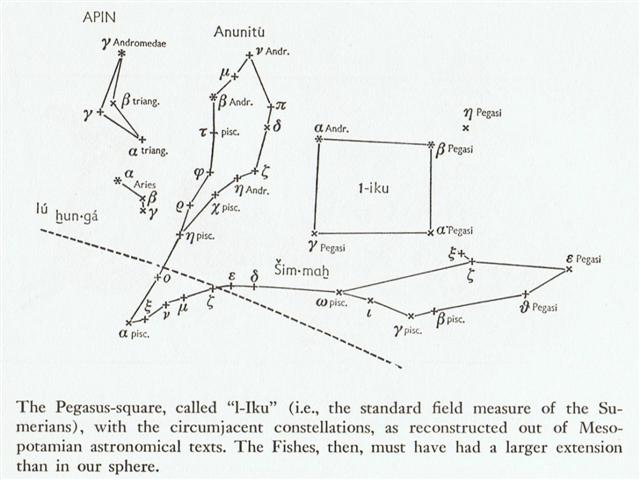 |
|
RIGHT ASCENSION DAYS AT THE FULL
MOON: |
|
Oct 4 (277) |
5 |
6 |
|
(213 = 197 + 80 - 64 = 197 + 16) |
AUG 2 (214
= 2 * 107) |
3
(29 + 186) |
|
13h (197.8)
ξ¹ Centauri (197.1), ξ² Centauri
(197.9) |
APAMI-ATSA (Child of Waters) =
θ
Virginis,
ψ
Hydrae (198.5),
DIADEM =
α
Com. Ber.
(198.9) |
AL DAFĪRAH (Tuft) =
β
Com. Ber.
(199.4)
*158.0 = *199.4 - *41.4 |
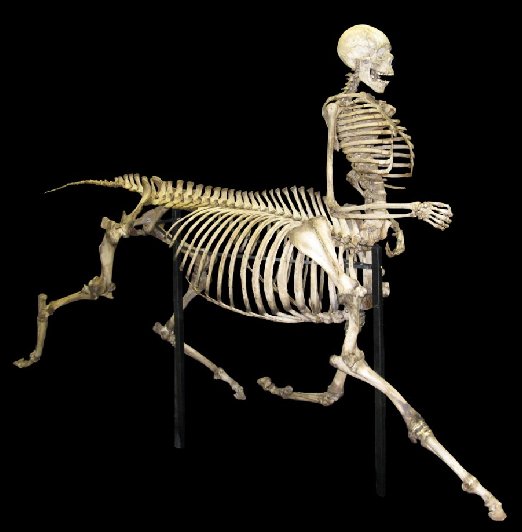 |
 |
 |
 |
 |
 |
 |
 |
|
Bb7-10 (674) |
(248 + 6) |
Bb7-12 (255) |
Bb7-13 |
Bb7-14 |
Bb7-15 |
Bb7-16 (680) |
|
kua moe
atu te manu |
ki raro
o tona manu
punua |
kua
vero koia |
kua moe
koia |
i te
eve o te manu |
ko te
tagata oho ia |
ka oho
oia |
|
Punua, burst of thunder.
Nua. 1. Mother; this
seems a more ancient word than
matu'a poreko. 2.
Blanket, clothing, cape formerly
made from fibres of the
mahute tree. Vanaga. Cloak
T. Churchill.
Nu'a 1. Thick; piled
one on top of the other, as
leis, mats, or ocean
swells; heaped; lush,
thick-growing; much traveled, as
a road; multitude, as of people,
mass. Also
hānu'a.
Moena kumu nu'a, a
sleeping mat made thick at one
end to serve as a head rest; lit.
'mat piled beginning'.
Nu'a
moena, a heap of
mats.
Nu'a kanaka, many
people.
Haki nu'a ka uahi i ke kai,
the spray breaks in masses in
the sea.
Ka nu'a o ka palai,
the thick clump of
palai ferns.
Ho'o nu'a, to heap
up; to give generously and
continuously; to indulge, as a
child; surging, rising in
swells, as the sea. 2. A kind of
seaweed. Nu'a-kea, a
goddess of lactation. Wehewehe.
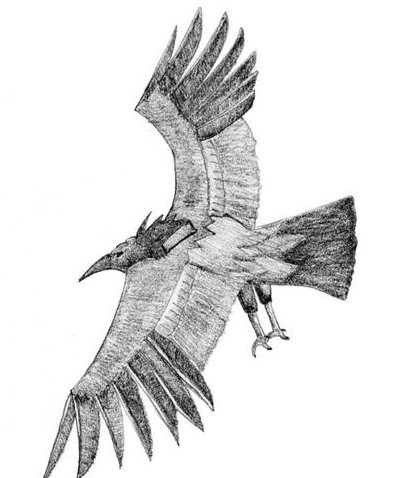
... The Raven
stole the skin and form of the
newborn child. Then he began to
cry for solid food, but he was
offered only mother's milk ...
Eve. 1.
Placenta, afterbirth (eeve).
T Pau.: eve, womb. Ta.:
eve, placenta. Ma.:
ewe, id. Haw.: ewe,
navel string. 2. The rear;
taki eeve, the buttocks;
hakahiti ki te eeve, to show
the buttocks; pupuhi eve,
syringe. 3. The bottom of the
sea. Churchill. |
|
April 8 |
9 (464) |
10 (100) |
11 (466) |
12 |
13 |
14 (104) |
|
No star listed (18) |
ADHIL (Garment's Train) = ξ
Andromedae
(19.3),
θ
Ceti (19.7) |
KSORA (Knee) =
δ
Cassiopeiae
(20.1),
ω
Andromedae (20.6),
γ
Phoenicis (20.8) |
δ Phoenicis (21.5) |
υ Andromedae (22.9) |
ACHERNAR (End of the River) =
α
Eridani
(23.3),
χ
Andromedae (23.6),
τ
Andromedae (23.9) |
ALSEIPH (Scimitar) =
φ
Persei
(24.5),
τ
Ceti (24.7) |
|
RIGHT ASCENSION DAYS AT THE FULL
MOON: |
|
Oct 7 (280) |
8 |
9 |
10 |
11 |
12 (285) |
13 (104 + 182) |
|
AUG 4
(*136) |
5 (210 + 7) |
6 |
7 |
8 (220) |
9 (*141) |
10 (104 + 118) |
|
... It was 4
August 1968, and it was the
feast day of Saint Dominic,
patron of Santo Domingo Pueblo,
southwest of Santa Fe. At one
end of the hot, dusty plaza, a
Dominican priest watched
nervously as several hundred
dancers arranged in two long
rows pounded the earth with
their moccasined feet as a
mighty, collective prayer [ui]
for rain, accompanied by the
powerful baritone singing of a
chorus and the beat of drums. As
my family and I viewed this, the
largest and in some ways the
most impressive Native American
public ceremony, a tiny cloud
over the Jémez Mountains to the
northwest got larger and larger,
eventually filling up the sky;
at last the storm broke, and the
sky was crisscrossed by
lightning and the pueblo
resounded with peals of rolling
thunder ...
 |
|
σ Virginis (200.4)
*159.0 = *200.4 - *41.4 |
γ
Hydrae (201.0),
ι
Centauri (201.4)
*160.0 = *201.4 - *41.4 |
Al
Simāk-12 (Lofty) /
Chitra-14 (Bright One)
/
Horn-1
(Crocodile) /
Sa-Sha-Shirū-19
(Virgin's Girdle)
/
ANA-ROTO-3
(Middle pillar)
MIZAR =
ζ
Ursae Majoris (202.4),
SPICA =
α
Virginis,
ALCOR = 80 Ursae Majoris
(202.7)
SADALMELIK (α Aquarii)
*161.0 = *202.4 - *41.4 |
71 VIRGINIS
(203.6) |
No star listed (204) |
HEZE =
ζ
Virginis
(205.0),
SOUTHERN PINWHEEL GALAXY = M83
Hydrae
(205.7) |
ε Centauri (206.3),
κ Oct. (206.4)
*165.0 = *206.4 - 41.4 |
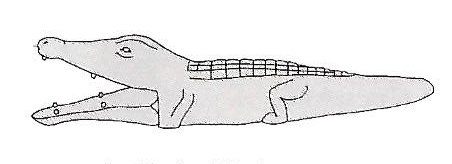 |
The distance from Vindemiatrix (*196) at the Full Moon
to her culmination (at 21h) when Beid
(*62) was at the Full Moon corresponded to the
distance from 276 (October 3) to
May 22 (142 + 364) = 230 days. And 230 - 46
= 184.
... Allen has documented
all his star culminations at 21h, which
could be due to an effort of keeping the
culminations at their proper places
according to the ancients, 24h (spring
equinox) - 21h = 3h = 24h / 8 = 45º. 3h
corresponds to 366 / 8 = 45.75 of my right
ascension days and *366 - *46 = *320
(Dramasa, σ
Octantis) ...
|
 |
*230 |
 |
 |
|
Bb7-6
(249) |
Ga7-11 (180) |
Ga7-12 |
|
(JAN 30) |
SEPT 17 (260) |
SEPT 18 (9 * 29)
→ 2 * 414 |
|
No star listed (*14) |
LESATH (*244) |
YED PRIOR (*245) |
|
VINDEMIATRIX (*196) |
BEID (*62)
VINDEMIATRIX |
HYADUM I (*63.4) |
|
JULY 31 (212) |
MARCH 19 (6
* 13) → 183 |
MARCH 20 (79) |
... Next,
she went all alone and arrived where the
tree stood. It stood at the Place of Ball
Game Sacrifice. What? Well! What's the fruit
of this tree? Shouldn't this tree bear
something sweet? They shouldn't die, they
shouldn't be wasted. Should I pick one? said
the maiden.
And then the bone spoke; it
was there in the fork of the tree: Why do
you want a mere bone, a round thing in the
branches of a tree? said the head of One
Hunaphu when it spoke to the maiden. You
don't want it, she was told. I do want it,
said the maiden. Very well. Stretch out your
right hand here, so I can see it, said the
bone. Yes, said the maiden. She stretched
out her right hand, up there in front of the
bone. And then the bone spit out its saliva,
which landed squarely in the hand of the
maiden ...
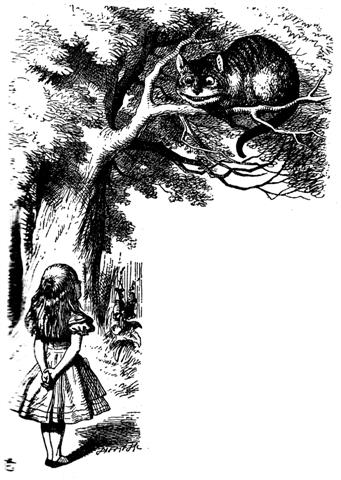
142 (May 22) + 364 = 506
→ number of glyphs on side b of the B
tablet. May 22
→ 5-22 → 522 →
2 * 261.
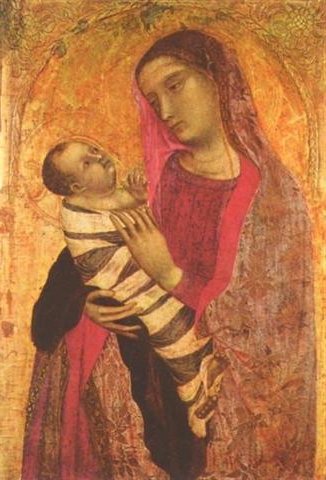
|



.jpg)
























